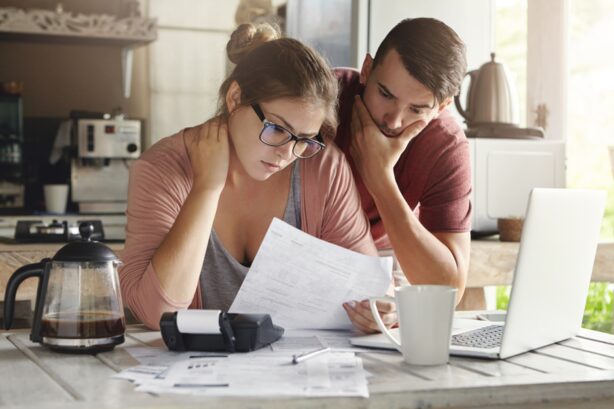If you’re having trouble paying your utility bill, you’re not alone. In fact, about one in six households are behind on their utility bills.
It can be a stressful situation, but don’t panic. There are various options available to alleviate the pressure.

Read on to learn what to expect if you are struggling to pay your electric bill, and get tips on helping you find ways to keep the lights on!
1. What happens if you don’t pay your electric bill?
You’re worried not paying your electricity bill could lead to severe consequences. You aren’t alone!
Knowing what to expect will equip you with the knowledge you need to take action and ensure you aren’t left in the dark.
From a procedural point of view, the following will likely occur if you fall in arrears:
- A default notice will be issued.
- A final notice is issued if no payment has been received.
- The energy supplier may then pursue alternative options for action and recovery, and/or disconnect the power supply.
Default Notice
- If you don’t pay your electricity bill, you’ll receive a kind reminder to nudge you toward compliance.
- The way your energy supplier will bring the amount owing to your attention is usually to send a letter called a default notice to your address. Sometimes, they may also contact you by phone.
- A default notice is your energy supplier’s first step in the collection process.
Final Notice
- If the default notice renders no results and no arrangements for payment have been made, eventually a final notice, a demand letter for immediate payment, will be sent.
- This notice serves to communicate the intention to disconnect your service, unless payment is received within a period specified in the letter. (The number of days may differ for different energy suppliers.)
- The final notice will often be sent along with a reminder call from the energy supplier’s customer services team.
Further Actions
- If the notices are ignored, an enforcement agent may be approached to reach out or visit the property to collect payment on behalf of the energy supplier.
- The energy supplier may also take further action by instituting legal action or court proceedings to recover the money owed to them.
- If the invoice remains unpaid, the power may also be disconnected.
Disconnection
- If payment is not received after multiple requests, the utility company may disconnect your service.
- Keep in mind that if you’re renting your property, a disconnection could cause issues with your landlord, and potentially make it harder for you to rent in the future.
- If you own your home, then getting the bill paid as quickly as possible will be necessary to get the electricity reconnected.
- Whether renting or owning, the electricity company may charge you an additional fee to reconnect service.
Solutions
- Call your provider immediately and explain your situation. The worst thing you can do is ignore a default notice.
- Make sure the account information on file with the utility company is correct—this will help them find you quickly if there’s an issue.
- Many companies have payment plans available for people that are struggling. Ask about entering into a payment plan to make small payments.
2. What happens if you don’t pay the electricity bill in full?
- If you are unable to pay your electric bill in full, you may be charged interest or late fees on what you owe.
- Depending on the company, the interest and fees may end up building up to a point that a default notice is sent requesting full payment.
- A bailiff’s fee could also be added to your bill if you don’t pay and the company needs to take steps to recover the outstanding balance.
Solutions
- If you have ongoing problems paying for electricity, contact your local government about financial assistance programs available in your area.
- Research ways to minimize your utility bills as much as possible. There are ways to save on your electric bill!
- If your energy supplier offers payment plans or settlement arrangements, take advantage of such options as soon as possible.

If you still haven’t paid off your debt after several months of being charged fees and penalties, you may be in a situation in which court action is taken against you for unpaid bills – which will cost even more money!
Get in touch with your utility company immediately and discuss your options with them, so they can help you find the best solution for your situation.
And remember, finding small ways to save money can really add up over time. Try a few easy methods and use the money you save to get those utility bills paid down once and for all!
